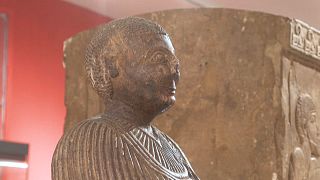Nigeria
The Benin National Museum will soon be welcoming home heritage that has been out of the country since the 19th century.
The Horniman, a museum located in London, announced early this month that it would return 72 artefacts looted during the colonial era, including its collection of Benin bronzes.
They will join other items that have already been repatriated, including the "Okukor," a cockerel sculpture taken by British colonial forces and returned to Nigeria by Jesus College, Cambridge, in October 2021.
The decision comes after Nigeria's National Commission for Museums and Monuments formally asked for them to be returned earlier this year.
"The ancestors are returning, so with baited breath, everybody is waiting and hoping to behold these objects," says Theophilus Umogbai, Director and curator of Benin City National Museum which received two pieces from the UK last year.
"People have been talking about these objects since 1897 and yet we are unable to access these objects to behold them, to view them," he adds.
The artefacts are more than just decorative objects, according to Umogbai.
"Each of the objects taken away represented an ancestor in captivity, not just an artwork but an ancestor in captivity. That will tell you how important the objects are. So, they are part of our history and when they were taken away it was our civil library was raided and vandalised, their return now will help to fill in those gaps," he says.
Benin City was the capital of the Kingdom of Benin, now part of Nigeria.
The Horniman's collection is a small part of the 3,000 to 5,000 artefacts taken from the Kingdom of Benin in 1897 when British soldiers attacked and occupied Benin City as Britain expanded its political and commercial influence in West Africa.
The British Museum alone holds more than 900 objects from Benin, and the National Museum of Scotland has another 74.
Others were distributed to museums around the world.
The artefacts include plaques, animal and human figures, and items of royal regalia made from brass and bronze by artists working for the royal court of Benin.
The general term 'Benin Bronzes' is sometimes applied to items made from ivory, coral, wood and other materials as well as metal sculptures.
For bronze casters, who learned their skills from their forefathers, it's very important to see the objects made by their ancestors back in their land.
"It is our heritage, we have not seen those bronzes, they were made by our forefathers. That bronze is heritage, it means that it is very, very important, if they can bring that bronze, we will be very happy," says Osapowa Ewen, bronze caster.
Countries including Nigeria, Egypt and Greece, as well as indigenous peoples from North America to Australia, are increasingly demanding the return of artefacts and human remains amid a global reassessment of colonialism and the exploitation of local populations.
Nigeria and Germany recently signed a deal for the return of hundreds of Benin Bronzes.
That followed French President Emmanuel Macron's decision last year to sign over 26 artworks of the 19th-century Dahomey Kingdom, present-day Benin, just west of Nigeria.
But British institutions have been slower to respond.
Nigeria's Federal Ministry of Information and Culture formally asked the British Museum to return its Benin Bronzes in October of last year.
The museum said that it is working with a number of partners in Nigeria and it is committed to a "thorough and open investigation" of the history of the Benin artefacts and the looting of Benin City.
Back in London, The Horniman recognises that it holds items "obtained through colonial violence."
The bronzes are currently displayed along with information acknowledging their forced removal from Benin City and their contested status.











Go to video
Ghana overtakes Nigeria in U.S. visa overstay rates, new report reveals
01:00
Chidimma Adetshina crowned Miss Universe Africa and Oceania
Go to video
Slavery: UK does not want 'money transfer' as reparation
01:05
Nigeria: Tinubu orders release of child protestors
01:19
Pressure mounting on Britain to pay reparations for transatlantic slave trade
Go to video
Nigerian MP caught on camera assaulting delivery driver